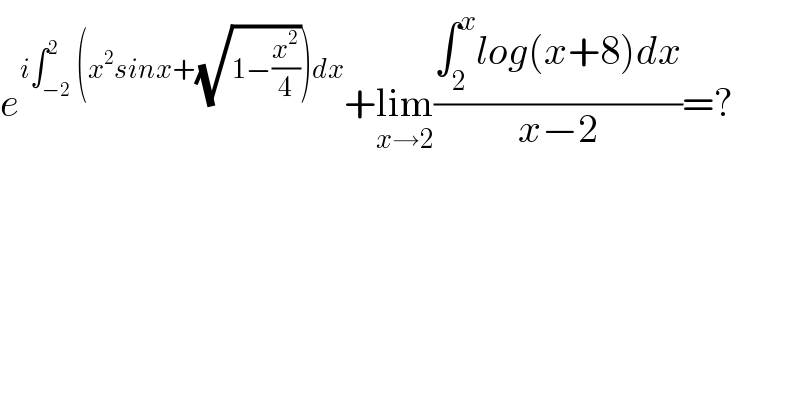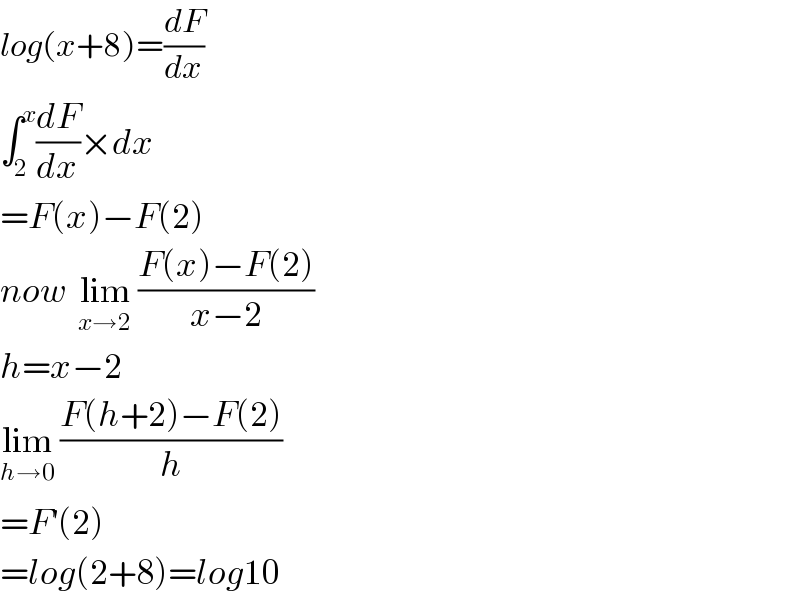
Question and Answers Forum
Question Number 58940 by Tony Lin last updated on 01/May/19

Commented by maxmathsup by imad last updated on 01/May/19
![let A =∫_(−2) ^2 (x^2 sinx +(√(1−(x^2 /4))))dx ⇒ A =∫_(−2) ^2 x^2 sinx dx +∫_(−2) ^2 (√(1−(x^2 /4)))dx x→x^2 sin(x) is odd function ⇒ ∫_(−2) ^2 x^2 sin(x)dx =0 ∫_(−2) ^2 (√(1−(x^2 /4)))dx =2 ∫_0 ^2 (√(1−(x^2 /4)))dx=_((x/2)=sin(t)) 2 ∫_0 ^(π/2) (√(1−sin^2 t))(2cost)dt =4 ∫_0 ^(π/2) cos^2 t dt =4 ∫_0 ^(π/2) ((1+cos(2t))/2) dt =2 ∫_0 ^(π/2) (1+cos(2t))dt =π +[sin(2t)]_0 ^(π/2) =π ⇒e^(i ∫_(−2) ^2 (x^2 sinx +(√(1−(x^2 /4))))dx ) =e^(iπ) =−1 ∫_2 ^x ln(t+8) dt =_(t+8 =u) ∫_(10) ^(x+8) ln(u) du =[uln(u)−u]_(10) ^(x+8) =(x+8)ln(x+8)−(x+8) −10ln(10) +10 ⇒ lim_(x→2) ((∫_2 ^x ln(x+8)dx)/(x−2)) =lim_(x→2) (((x+8)ln(x+8)−(x+8)−10ln(10) +10)/(x−2)) =lim_(x→2) ((u^′ (x))/(v^′ (x))) (using hospital theorem) u(x)=(x+8)ln(x+8)−(x+8) −10ln(10) +10 ⇒ u^′ (x) =ln(x+8) +1 −1 =ln(x+8) ⇒u^′ (2) =ln(10) v(x) =x−2 ⇒v^′ (x) =1 ⇒ lim_(x→2) ((∫_2 ^x ln(x+8))/(x−2)) dx =ln(10) ⇒ e^(i∫_(−2) ^2 (....)) dx +lim_(x→2) ((∫_2 ^x (....)dx)/(x−2)) =−1+ln(10) here i have taken ln not log because log(x) =((ln(x))/(ln(10))) ....](Q58955.png)
Commented by maxmathsup by imad last updated on 01/May/19

Commented by Tony Lin last updated on 02/May/19

Answered by tanmay last updated on 02/May/19

Commented by Tony Lin last updated on 02/May/19

